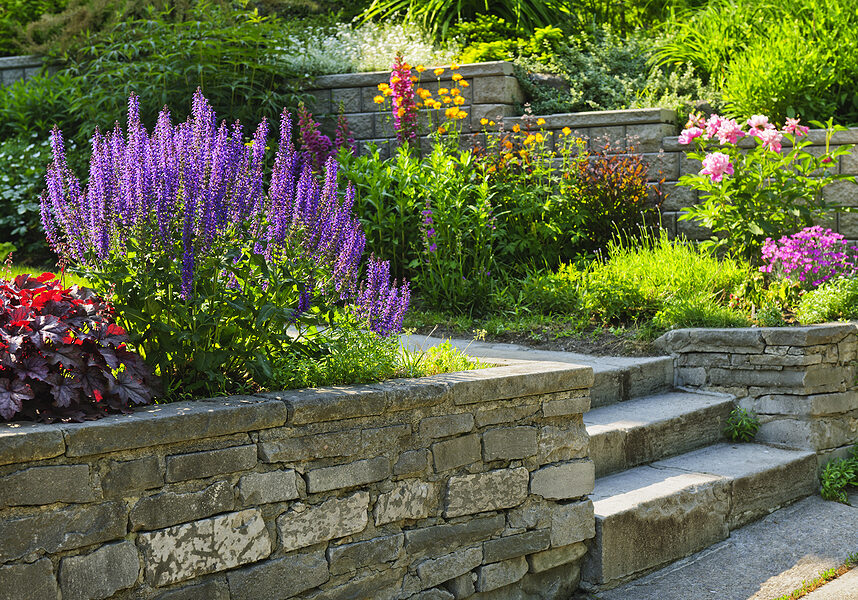Concrete Retaining Walls

A retaining wall is simply a wall that holds or retains something behind it, most commonly soil. There are a wide variety of materials that can be used, to create a retaining wall however, the most common option is concrete. With its long lifespan and aesthetically appealing look, concrete is one of the best materials for the job. South Bend Concrete Contractors Co has a team of highly skilled and highly trained contractors. With access to the state of the art equipment and only the best quality materials, your concrete retaining wall will be done to perfection and provide you with the longevity concrete has to promise.
Materials Used for Retaining Walls
Over time a large variety of retaining wall materials have been used to change the landscape in which we live. Often made from materials such as timber, natural stones, and concrete. While wood is an inexpensive option for a retaining wall, it has a short lifespan. Because it can decompose it can be a poor choice of material. Stone and rocks although can make great retaining walls, the installation is incredibly labor-intensive and costly. Further to this, the maintenance that is required is high and difficult.
Concrete is a great material choice for retaining walls. The strength of the material works to sufficiently keep everything in place and the low effort maintenance plan and affordable installation cost is one of the best material choices.
Benefits of Using Concrete Retaining Wall
Rain and wind can have a big effect on landscapes. Erosion of soil can be a massive problem if the correct steps are not followed. Erosion can cause damage to your property's structural integrity and make the overall building difficult to maintain. One of the best and most effective solutions is the installation of a high-quality retaining wall. Given all the materials that can be used for your retaining wall, why does concrete stand out as the best?
Affordability
Concrete is one of the most affordable construction materials available. Compared to natural stones, bricks, and other materials, concrete is durable enough to last for years. In fact, it can stand extreme temperatures and weather conditions. With its strength, concrete can control erosion making structures safe from soil erosion. That being said, you get to save more in the long run.
Easy Installation Process
Retaining walls made of concrete are very easy to install. It is easy and fast to install provided it is done by professionals. That's where you need us. With proper installation, a concrete retaining wall can last for decades, a lifetime even.
Flexibility
Concrete is versatile and can have almost any style or texture incorporated into it for an aesthetically pleasing look.
Maintenance
Cleaning and maintaining your retaining wall is key to improving its lifespan. Ensure you inspect the retaining wall frequently, any signs of cracks or damage need to be dealt with immediately to stop further damage from occurring. Proactive repairs will ensure the hardscape not only looks as good as new but will ensure it can function at the best of its abilities.
Durability
Concrete is a popular choice for a variety of hardscaping projects, because of the importance that a retaining wall holds it is vital to understand the longevity of the material as, after all, it is an investment. A retaining wall is exposed to external conditions and because of this, it needs to be strong and able to withstand even the harshest of weather conditions for a long period. In general, a concrete retaining wall provided the correct care has taken place can last anywhere from 50 to even 100 years, so you really can get bang for your buck.
Types of Concrete Retaining Wall Systems
We at South Bend Concrete Contractors Co offer a wide selection of concrete retaining wall systems for your outdoor space. Depending on the type of wall you want or the wall design you're aiming for, you can choose from any of the following:
Gravity Retaining Walls
A gravity wall is the most basic type of retaining wall. The gravity wall uses sheer weight and mass to retain soil. Gravity walls come with the most amount of material choices. The choices include pavers, natural stone, and bricks. Although short walls do not need additional reinforcement, tall walls will require a trench to be excavated for the wall to fit into.
Cantilevered Retaining Wall
Also known as reinforced retaining walls, cantilevered walls use a retaining wall that's attached to a slab foundation under the soil. The weight of the upper soil holds the slab down so the wall won't lean forward. A cantilevered wall is ideal for commercial retaining walls because of its durability.
Mechanically Stabilized Earth (MSE) Walls
Reinforcement may be layered within an earth backfill to enable it to support itself behind a concrete wall facing. As a result, the soil becomes self-supporting. There are at least four proprietary methods available in the country today. Each of these methods is made up of three parts: the front face, the backfill, and the reinforcement.
Anchored Retaining Wall
Anchored walls support the retaining wall "fronts" by anchoring them to the earth and then attaching them using cables or strips. In most cases, it is injected with pressurized concrete or expanded mechanically after being driven into the ground.
Sheet Piling Retaining Wall
Protecting adjacent structures with sheet piles is common practice. It helps prevent soil movement near foundations, especially in the presence of soft soil.
Segmental Retaining Walls
Segmental retaining walls are composed of modular concrete blocks interlocking with each other. Their purpose is to stabilize a sloped face of soil to provide a solid front. As a result of segmental retaining walls, higher than usual wall heights can be achieved while retaining the pressure caused by lateral earth pressure created by backfill soils.
Allan Block Retaining Walls
Building retaining walls requires professional engineering. There's a lot of things to consider to ensure high-quality results. Apart from selecting the right retaining wall system, you also need to consider choosing the right building material. As mentioned, concrete is the most popular choice. There are so many wall types you can do using it.
While there are many suppliers and manufacturers out there, our company uses Allan Block retaining walls for most of our projects. Apart from its quality, the brand's wide variety of block walls makes it easier to choose what's suits your outdoor living space.
Allan Block offers a selection of retaining wall products. You can choose any color, shape, or size based on your requirement. The collection is basically precast concrete or poured concrete block made to your aesthetic requirements.
Why Hire Us
There are many concrete contractors in the area. The competition is real, for sure. But, we remain on top. Here are the major reasons why:
Licensed Contractor
What started as a small family business has grown to what it is today. With years of experience in the concrete industry and proper licenses, you can rest knowing your project is in good hands.
Compliant to Local Building Codes
With years of experience in building walls, rest assured our company adheres to standards set by the industry and is compliant with local building codes. Our company ensures we follow all building regulations to avoid any future problems, particularly on the building structure.
High-Quality Retaining Wall Blocks
Our company offers industry-standard concrete retaining wall blocks. Unlike natural stone and wood plank, concrete blocks are durable and easy to install. More so, with proper installation, it could last for decades. To ensure strength, we make sure that behind the wall is a compacted soil and a layer of compacted sand and gravel. Doing so will keep the wall site flat and stronger.
Superb Customer Service
Customer satisfaction is important to us. That is why we provide an end-to-end concrete service. We handle all the work from you. From providing free cost estimates, completing application requirements and additional license requirements, working on the building permit application to the actual execution of the project. Even after the construction, you can still rely on us for repair and maintenance needs.
Affordable Price Range
The average cost of concrete retaining walls varies depending on the type of wall. To give you an idea, for interlocking blocks, the price range varies between $20 and $30 per square foot. Meanwhile, for a poured concrete wall, it could cost from $30 to $40 per square footage. We at South Bend Concrete Contractors Co have the most competitive prices in the South Bend, IN area. Call us today for a free cost estimate.
Free Cost Estimates
We know how the budget affects any construction project. That is why we are here to provide you a realistic, no-commitment quotation free of charge. All you have to do is contact us through phone or via email.
Contact Us Today
Are you planning the installation of a retaining wall on your property? Look nowhere because you landed on the right page. We at South Bend Concrete Contractors Co have years of experience to boast. We are known for building high-quality walls in the South Bend, IN area.
Let's discuss what you need. Call us during business hours. We are more than happy to assist you. You may also opt to send a message online. Head on to the Contact Us page and complete the form. You should receive a reply from us within the next business day.
